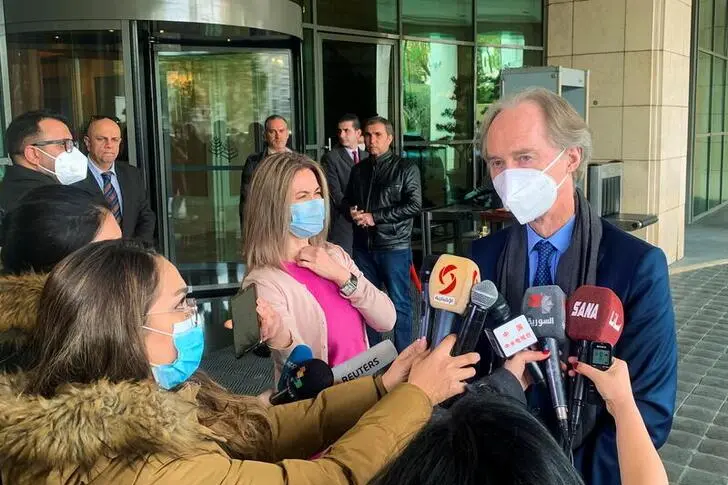PHOTO
“It is absolutely vital to maintain and expand access, including cross-border and cross-line operations,” Geir Pedersen told the 15 members of the council.
His comments came as Western council members appear to be heading for a showdown next month with Russia and China — both of whom are permanent members and hold the power of veto — over the renewal of the mandate for the aid operation in Syria.
UN Secretary General Antonio Guterres warned council members on Wednesday that a failure to renew the cross-border mechanism for aid to Syria would have “devastating consequences” for civilians across the war-torn country.
The previous cross-border authorization was approved in 2014 and covered four border crossings. Opposition in the past year from Russia and China to the renewal of all four has resulted in three of them closing, leaving only one still operating, at Bab Al-Hawa on the border with Turkey. The mandate for this crossing will expire on July 10, and so a successful Security Council vote is required if it is to stay open beyond then.
“A large-scale cross-border response is essential for an additional 12 months to save lives,” Pedersen told council members.
The UN estimates that more than 13 million people across Syria need humanitarian assistance to survive.
Russia argues that the international aid operation violates the sovereignty and territorial integrity of Syria. The Russian ambassador to the UN, Vassily Nebenzya, has dismissed the need for cross-border assistance as “an anachronism.”
He said his country initially accepted the mechanism because Syria “was (then) riven into parts by terrorists.” He argues that Syria has now been “liberated” and so all aid to the north should go through Damascus.
Nebenzya blamed the deteriorating humanitarian situation in Syria on the West’s “illegal economic sanctions.”
He added: “We consider this a continuing attempt to oust the legal authorities of the country through economic suffocation.”
China’s representative at the meeting also blamed the economic problems in the country on unilaterally imposed Western sanctions. He called for them to be lifted, and warned that “any scheme to effect regime change in Syria must be utterly renounced.” He also called on the council to separate humanitarian aid from the political process.
However the US ambassador to the UN, Linda Thomas-Greenfield, who recently visited the Bab Al-Hawa crossing, said the “dire humanitarian crisis directly informs the political situation.”
She called on the council to reauthorize the crossing, describing it as “a literal lifeline for millions of Syrians,” and reinstate two other crossings at Bab Al-Salam and Al-Yaroubiyah. She warned that the political situation will go from bad to worse if Russia and China continue to refuse to renew the cross-border mandate.
“If we cut off cross-border aid, we further destabilize the region — it will encourage more internally displaced people to flee,” said Thomas-Greenfield.
“As everyone made clear to me when I visited the border — refugees, NGO representatives, UN humanitarian workers, local experts — there is no alternative for cross-border assistance. None.”
The American envoy reiterated that her country will not normalize or support any reconstruction aid that benefits the Assad regime.
France’s permanent representative, Nicolas de Riviere, pleaded with the council not to abandon the Syrian people “to the goodwill of the Assad regime,” and instead to return to “the heart of (resolution) 2254.”
Resolution 2254, adopted in December 2018, calls for an immediate ceasefire, constitutional reforms and “free and fair elections” to be held. It also calls for the release of all detainees, the disclosure of the fate of all people who were forcibly disappeared, and arrangements to be made for the dignified and safe return of displaced people and refugees.
Special envoy Pedersen said that he laments the failure to make any real progress on the political track and regrets the “gulf of mistrust between the parties and the complexity of the situation on the ground,” as he urged the council to unite.
“Trust and confidence will be built through actions not words,” he said. “Key players need to be ready to come to the table with the necessary goodwill and something to deliver.
“I believe we need a new, constructive international dialogue on Syria to discuss concrete steps — steps that should be reciprocal and mutual, defined with realism and precision, implemented in parallel, and which are verifiable.
Copyright: Arab News © 2021 All rights reserved. Provided by SyndiGate Media Inc. (Syndigate.info).





















